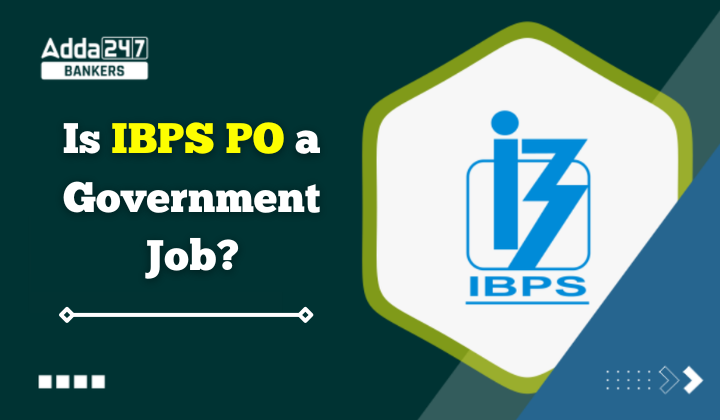Many candidates have a question in their minds whether IBPS PO is a government job? And the answer is “Yes” but there are several key differences. To truly understand the nature of this desired role, it is important to know in-depth about the ownership of Public Sector Banks (PSBs) and the benefits enjoyed by their employees. In this article we have discussed about whether IBPS PO is a government job? and the role, benefits and how to crack the exam in 2025.
Is IBPS PO a Government Job?
Yes, IBPS PO is considered a government job, but more specifically, it is a public sector job. IBPS PO officers are recruited in public sector banks (PSBs), such as Punjab National Bank, Bank of Baroda, Union Bank of India, Canara Bank, etc. These banks are owned and operated by the Government of India, which makes them part of the public sector. Although IBPS itself is an autonomous body, the jobs it offers through the PO exam are in government-controlled banks, which makes them at par with central government jobs in terms of benefits, job security, and perks.
Role of IBPS PO
The position of a Probationary Officer in a public sector bank like those recruited through IBPS is dynamic and packed with responsibilities that ensure smooth banking operations. An IBPS PO acts as a key link between the bank and its customers while also contributing to the internal functioning of the branch.
1. Frontline Banking Services: IBPS POs are usually the first point of contact for customers at the branch. They assist in resolving customer queries, explaining banking procedures, promoting digital banking, and guiding them on available financial products.
2. Operational Oversight: Probationary Officers are involved in managing core banking functions such as account opening, cheque clearances, ATM-related issues, and other routine banking services. They play an active role in ensuring smooth daily operations.
3. Credit and Loan Management: One of the significant responsibilities includes processing loan applications, evaluating the creditworthiness of applicants, conducting background checks, and preparing documentation for various types of loans like personal, home, and vehicle loans.
4. Team Coordination & Supervision: As part of their training and rotational assignments, POs work across various departments and may oversee the work of clerical staff, ensuring that all tasks are carried out efficiently and as per guidelines.
5. Policy Implementation: IBPS POs are responsible for implementing new banking policies, schemes, and RBI directives at the ground level. They ensure that regulatory compliance is maintained in all banking activities.
6. Reporting & Documentation: Preparing periodic reports, maintaining proper records, and submitting performance data to senior officials is also a regular task. This helps in analyzing the branch’s productivity and service quality.
7. Continuous Learning & Training: Being a PO is a learning curve. Officers are constantly trained and evaluated in various banking areas, such as risk management, customer service, finance, and regulatory practices, to prepare them for higher managerial roles.
How to Crack the IBPS PO 2025
Preparing for the IBPS PO 2025 exam from scratch may seem overwhelming, but with the right strategy, resources, and consistency, you can confidently crack each stage of the selection process Prelims, Mains, and Interview. Here are the pointers to crack IBPS PO 2025.
1. Grasp the Exam Structure Fully
Before you begin your preparation, it’s essential to understand the complete structure of the IBPS PO exam. The selection process is divided into three main stages: Prelims, Mains, and Interview. The Preliminary exam is an objective-type test that includes Reasoning, Quantitative Aptitude, and English Language. Those who clear it appear for the Mains, which includes more advanced reasoning, data analysis, general/economic awareness, English, and a descriptive test.
2. Analyze Syllabus and Pattern Thoroughly
Once you know the exam stages, the next step is to go through the detailed syllabus. Every section Reasoning, English, Quant, GA, Computer, and Descriptive has specific topics that must be covered. Make a checklist of topics and use it to track your progress. This will not only help you focus but also ensure no topic is left out. Understanding the weightage of each section can also help prioritize what to study first.
3. Build Strong Foundations Before Speed
It’s tempting to jump into solving questions quickly, but if you are starting from scratch, focus first on understanding basic concepts. Whether it’s grammar rules in English or formulas in Quant, clarity in fundamentals is essential. Solve basic-level questions to gain confidence, and only then shift to speed-building exercises. This approach will help you avoid silly mistakes and reduce confusion during the exam.
4. Create a Realistic Study Timetable
Planning your time well is key to effective preparation. Design a study plan that covers all sections of the syllabus with proper time for revision and practice tests. For starters, dedicate 4–5 hours daily and gradually increase it as the exam nears. Allocate specific time slots to each subject, and include short breaks to avoid burnout. Stick to your timetable and adjust it weekly based on your performance and learning pace.
5. Structured Practice & Revision
Practice is what turns your preparation into performance. Start with topic-wise practice and gradually move to full-length mock tests. Aim to take at least 50+ or more if you can takes mocks before the exam. After each mock, analyze your mistakes and weak areas. Revise the concepts regularly, and focus more on accuracy than just speed. Set weekly goals and evaluate your progress every weekend. This continuous loop of practice and revision will sharpen your preparation.
6. Sharpen Time Management
Time is the biggest challenge in competitive exams. Learn to manage it wisely. In the prelims, you get only 20 minutes per section, so speed and accuracy matter the most. Practice sectional tests with timers and train your mind to switch between sections efficiently. During mocks, experiment with different strategies to find what works best for you. Time management isn’t just about solving fast it’s about solving smart.




 Daily Current Affairs Quiz 23rd February...
Daily Current Affairs Quiz 23rd February...
 Bank of Baroda Office Assistant Exam Ana...
Bank of Baroda Office Assistant Exam Ana...
 Bank of Baroda Office Assistant Memory B...
Bank of Baroda Office Assistant Memory B...








